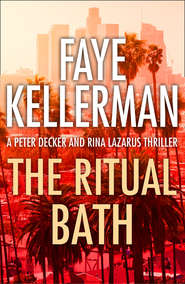По всем вопросам обращайтесь на: info@litportal.ru
(©) 2003-2025.
✖
Sanctuary
Автор
Год написания книги
2019
Настройки чтения
Размер шрифта
Высота строк
Поля
“Of course, husbands do like to learn with their sons. Gershon liked it when Pessy was born. Made a big deal about now having mezuman.”
Rina didn’t answer. Mezuman—a quorum of three men—was needed to recite a special blessing before Birkat HaMazon, the grace after meals. When the boys got big, Gershon could now say the extra blessing each time he ate.
Rina said to Mendel, “Your father must enjoy learning with you.”
Mendel didn’t answer. His expression said it was none of her business. Honey hadn’t noticed, as she was back observing the scenery. Eyes focused out the window widened as the car passed an industrial park, its walkways and parking lots lined with palms. She took her younger children’s hands. “Those are palm trees, kids! Aren’t they just majestic and beautiful? Don’t you feel like you’re in a tropical rain forest?”
Rina re-eyed the industrial park. It took a big stretch to imagine a tropical rain forest, but she said nothing. The kids were also quiet, perplexed by their mother’s enthusiasm.
Honey laughed softly. “I keep forgetting. They haven’t grown up with TV and all those kinds of fun picture books. They have no idea what tropical means.”
10
The recent rains had not only greened the mountains but had washed the rankness from the streets of metro LA. As in most cities, the downtown area was hardly pastoral, but it wasn’t as beaten as others Decker had seen. It was a mixture of gentrification and seediness, a city with an identity problem. Central LA played host to the seat of city government as well as a few fine hotels. In addition, the area had the old, established banking and law firms. But there was more to downtown than just maintaining the past.
Signs of urban renewal—the recently constructed neon-green convention center complex, a top-of-the-line apartment city, a spanking new library. Like the phoenix, the building was resurrected from the ashes of the old one. Decker heard people talking about the city going down the tubes, yet he remained optimistic. Sure he’d seen the worst aspects of human nature. Yet he’d also seen plenty of everyday heroes—ordinary men and women who had risked their lives to help others. He wasn’t just a fair-weather Angelino. He was in it for the long haul.
Today, Decker’s spirits were high. It was the weather. The air was crisp, the sky as soft as cashmere, gauzed with filmy, mother-of-pearl clouds. Tall buildings were bronzed by the low sun, the beams bouncing off glass and metal. The urban decay seemed softened as if photographed through a hairsprayed lens. There was a lot of foot traffic—the business suits, the immigrants, the homeless, the vendors—but it was flowing smoothly. A steady breeze rippled through the parade of clothing.
He negotiated the unmarked through a series of turns until he found the diamond center—a twenty-story monolith of granite near Sixth and Hill. Luck was with him and he found street parking. He eased the Plymouth curbside and shut off the motor, checking his notes before he went inside. Satisfied, he got out and walked through the center’s doors.
The lobby, like the exterior, was fashioned from the same gray granite and presented as hard as a steel vault. The reception area was fronted by a mountainside of stone which held the building’s directory. On either side were banks of elevators. Decker knew the unit number and pushed the button for the Otis special. The elevator soon opened and out came an array of foreign speech and Chasidic dress. His eyes followed the black robes of the ultra-Orthodox Jews and he almost missed the elevator.
He knew there were lots of Orthodox Jews in the diamond business. He also knew there were lots of secular Israelis like Yalom in the business as well. He wondered how they got along.
Then he wondered if there were other people besides Jews in the business at all.
He got off on the thirteenth floor, walked down a carpeted hall until he got to 1306. The door sign said YALOM AND GOLD, INC. The doorframe held a small, metal-cased mezuzah.
This mezuzah was on the outside doorframe. Yalom knew the difference.
Decker peered down the foyer. Lots of mezuzahs. And lots of closed-circuit cameras. He rang the buzzer to 1306. An accented female voice asked who was there. He answered and was allowed to pass through the portal.
Yalom and Gold, Inc., wasn’t much for decorating. The reception area was basically a carpeted sally port—a passageway from the outside to the inner sanctum. A young, pretty receptionist sat behind a glass cage. She had a coffee-colored complexion set into drawn curtains of shiny, ebony hair. Brown eyes looked him over. Decker smiled and took out his identification.
“One minute,” she said, speaking through a voice amplifier. She picked up the phone. Her lips moved but Decker couldn’t hear what she said. Holding the receiver up to her ear, she said, “May I see your identification again, please?”
Decker took out his shield and accompanying card. The woman looked it over carefully. “Mr. Gold will be right with you.” She turned off her mike and went back to work.
No chitchat with this one. Decker looked around, feeling as if he were about to enter prison. Two more closed-circuit cameras were placed in the upper corners. He thought about waving, then nixed the idea. With no place to sit, he stood in place and rocked on his feet.
A minute later, a fifties-plus man came through the inner door, his appearance slightly unkempt—shirt wrinkled at the collar, tie askew, pants unpressed. He was balding, his salt-and-pepper hair combed to the side. Built solidly with a big chest and thick wrists, he looked like a man used to physical labor, uncomfortable in the black suit he was wearing. His eyes seemed sharp, his expression marked with suspicion. But he held out his hand in an effort to appear friendly. Decker took the proffered hand.
“All night I’ve been making phone calls.” The man also had a thick accent. “It’s meshuga, Arik taking off like this. It doesn’t make sense.”
“Shaul Gold?” Decker asked.
“Yes, yes, of course.” Gold was irritated. “Who else would I be? Let’s go in the office. Yochevet is trustworthy but she has a big mouth.”
“Not as big as yours,” the receptionist’s amplified voice piped in.
Gold waved her off but she didn’t seem offended. “This way.”
Yochevet buzzed them through. Decker followed Gold down a short hallway into an office as bright as an atrium. Two walls of glass allowing a full view of the action from a thousand feet up. Not a place for an acrophobic. Or a claustrophobic.
Because the office was tiny.
It was set up like a lunch counter. Two stools sat tucked under a black Formica bartop. Gold pulled out a stool and motioned Decker to sit. He went around to the other side and sat as well, behind him a panoramic view of Pershing Square still under construction. At Gold’s right was a brushed-steel vault. Above the safe were TV monitors showing the front entrance as well as the sally port. So far, the coast was clear. Between the TV monitors was a picture of the recently deceased Lubavitcher Rebbe. He wore a black hat that covered his head and a full beard took up most of his face. But it was easy to see the great Rav was smiling in the photo—the kind, crinkly eyes.
Since Arik had been described as anti-religious, Decker wondered if the picture of the rabbi was Gold’s doing. He didn’t seem religious, though. He wasn’t wearing a yarmulke.
Decker’s eyes went back to the counter. On the top was a scale, a scoop, a jeweler’s loupe, and a two-by-two desk calendar, each square marked with appointments and obligations in multicolored inks and pencil. On the fifteenth, spilling over to the sixteenth, sat a heap of loose diamonds.
Decker kept his face flat, but was floored. Thousands of dollars of gems carelessly scattered on an old, marked-up calendar. Gold fingered them gently.
“I’ll finish up later.” In one clean motion, Gold picked up the scoop and swooped the stones off the calendar. He stopped and studied Decker. “Unless you’re interested. I give you a good price.”
Decker smiled. “Some other time.”
Gold said, “Once a salesman …” He poured the diamonds into an envelope and stowed them behind the counter. His features weren’t bad—light, gentle eyes softened a strong chin and a bulbous nose—the kind that comes from genes rather than booze. Gold rubbed his arms. “Sure you’re not interested? It’s a new shipment.”
“Positive,” Decker said. “Do you always leave your diamonds in the open like that?”
Gold’s eyes met Decker’s straight on. “I have a gun under the counter. Someone starts something, I finish it. You want to see my license?”
“Not necessary.”
Gold said, “Besides, you’re the police. If you steal from me, you’re in worse trouble than me.”
“How do you know I’m the police?”
“I saw your ID through the cameras when you showed it to Yochevet. If I don’t like what I see, I don’t buzz you in.” Gold rotated his neck and pointed to the TV monitors. “We’ve got cameras and more cameras. On the outside, on the inside. The system works so you can’t open the outside door and the inside door at the same time. For my protection. Still, everyone here walks around looking over their shoulders.”
“You’ve had incidents?”
“We’ve had robberies. Terrible.” Gold shook his head. “One man was beaten so bad he almost died. Why you think I got a gun? Six years I spent in the Israeli army. One thing it does is make you comfortable with guns. That’s a good thing. When you don’t know what you’re doing, that’s when you screw up.”
“The old man who was beaten,” Decker said. “Did they mug him in the hallway or come into his office?”
“In the hallway. But there have been muggings in both places.”
“Does Arik have a gun?” Decker asked.
“This is a shared office. We share the gun. So far, no need for it, Baruch Hashem.”
“Does Arik have a gun at home?”
Gold was quiet for a moment. “No, I don’t think so. He didn’t want guns around the house because of the boys. Teenage boys can do some very dumb things.”











